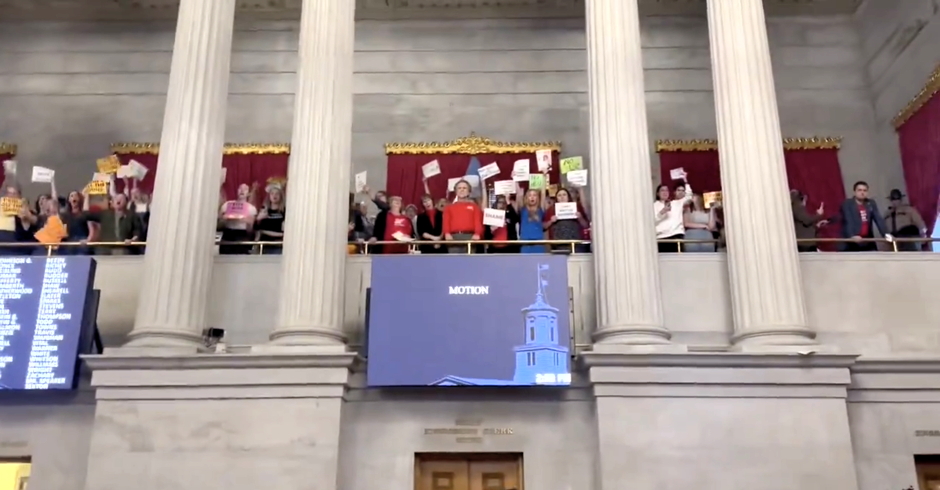News
How The Boy Scouts Tricked America Into Thinking They No Longer Discriminate Against Gays
BSA Lifted National Ban, But Most Troops Still Bar LGBT Leaders Thanks To Religious Exemption
In the face of plummeting membership, declines in corporate and foundation giving, pending litigation, and widespread condemnation of its discriminatory policies, the Boy Scouts of America (BSA) ended its blanket bans of gay scouts in May 2013 and of gay adult leaders in July 2015. These actions were taken in an attempt to restore the BSA’s tarnished image.
Whether the BSA has succeeded in doing so remains an open question. The BSA is no longer a major target of LGBT activists, but many of its troops continue to discriminate against adult scout leaders, and many parents would prefer that their children not participate in an organization so tainted by a history of bigotry.
Supreme Court “Victory”
At one time, the BSA enjoyed almost universal approval. As revered as apple pie and motherhood, the organization was one of the most beloved of American institutions. However, its leaders managed to besmirch their own brand by their stubbornness and failure of vision.
They fought all the way to the U.S. Supreme Court to preserve their right to discriminate against gay youth and adult employees. They ultimately won, but their victory was pyrrhic. It had the effect of associating, perhaps irrevocably, the organization with blatant bigotry.
It is not clear exactly when the BSA officially banned “avowed homosexuals” from membership in the organization, but it was in effect at least as early as 1978. The case that reached the Supreme Court was brought by Lambda Legal on behalf of Eagle Scout and former assistant Scoutmaster James Dale in 1990. He had been active in a New Jersey troop during the 1980s, but the Monmouth Council of the BSA forced him out when they read a newspaper article that mentioned his membership in a gay student group at Rutgers University.
Ruling against Dale, New Jersey Superior Court judge Patrick McGann accused him of “moral depravity” and used material from the Bible to support his decision in favor of the Boy Scouts. Dale and his lawyers, led by Evan Wolfson, appealed the decision, and the state appellate court ruled that the Boy Scouts was a “public accommodation” and had to obey the state’s anti-discrimination law.
The Boy Scouts then appealed to the Supreme Court. In June 2000, a bitterly divided Court ruled 5-4 that the New Jersey law banning discrimination against homosexuals did not apply to the Boy Scouts. Citing the organization’s First Amendment right of freedom of association, the U.S. Supreme Court supported the organization’s policy of banning gay members and leaders. The majority opinion, written by Chief Justice Rehnquist, was joined by Justices O’Connor, Scalia, Kennedy and Thomas; dissenting were Justices Stevens, Souter, Ginsburg and Breyer.
The Supreme Court decision in its favor was probably the worst thing that has ever happened to the BSA, for not only did it encourage their leaders’ stubbornness, but it also emphasized that the BSA was a private organization. As such, it had the right to discriminate, but it also had no claim to favored treatment by the government and civic groups, which it had previously enjoyed. Moreover, others had the right to speak out against its discriminatory practices and to insist that taxpayer and community dollars not be used to subsidize discrimination by a private quasi-religious organization.
In addition, the court victory also had the effect of making the organization more conservative and more dependent on religious groups, as many of the troops sponsored by civic organizations, especially in liberal areas of the country, left the BSA as a result of the discriminatory policies. The Boy Scouts became more religious, more rural, more intolerant and less like the rest of American society.
A History of Decline
In the years following its “victory,†the BSA steadily suffered membership losses. As the American public gradually moved to support LGBT rights, the BSA also lost major donors, especially from corporations and foundations that had enacted nondiscrimination policies. In addition, municipalities, government groups and charitable organizations pointedly disassociated themselves from the BSA; and major entertainers refused to perform at its jamborees.
It became a mere shell of its former self, more famous for bigotry than for building character, with most of its membership concentrated in church-sponsored troops in the Bible belt.
To make matters worse, in 2012, perhaps in an attempt to reassure conservative church groups, the BSA forcefully reaffirmed its commitment to ban openly gay youth and openly gay adults from scouting.
In response, LGBT groups escalated their campaign against BSA’s discriminatory policies. Activists gathered thousands of signatures on petitions calling for an end to the gay ban. They called attention to many news stories of the BSA kicking out lesbian moms and gay youth, of Eagle scouts denied their hard-earned badges, and of employees fired when their sexual orientation became known.
In addition, several liberal church groups and individual congregations abandoned their Boy Scout affiliations in protest of BSA’s discrimination. Many former Eagle scouts returned their badges, while others erased their Boy Scout experience from their résumés, afraid that association with the BSA was something that might harm rather than enhance their career prospects.
BSA councils from across America began feeling acute pressure to change or ignore the anti-gay policies. It became increasingly difficult to defend an organization that denied qualified, dedicated scouts their Eagle badges just because they had come out as gay or that refused to accept as volunteers the gay or lesbian parents of scouts.
Admitting Gay Scouts
In 2013, under intense pressure, the BSA amended its bylaws to permit gay scouts. But in a compromise intended to placate its faith-based sponsors, it maintained the prohibition against openly gay adult leaders and employees. In effect, it adopted a “Don’t Ask, Don’t Tell†policy for gay scout leaders two years after the military’s “Don’t Ask, Don’t Tell†policy had been repealed.
The so-called “compromise†continued to brand gay people as potential predators and created the absurd scenario in which openly gay scouts were presumed acceptable but as soon as they turned 18 were no longer welcome in scouting. The compromise pleased neither the critics of the discriminatory policy nor those who supported it.
Although some people hailed the change as a first step toward ending discrimination in the Boy Scouts, it failed to restore the BSA’s reputation.
The end to discrimination against openly gay boys went smoothly enough, with only a small loss of church-sponsored troops leaving the organization in protest. Still, BSA leaders must have quickly realized that their problem with a negative image and declining membership and falling donations would be solved only when the ban on gay adult employees was also ended.
Enter Robert Gates
That realization may have led to the surprising decision to seek the aid of former Secretary of Defense Robert Gates, who had overseen the end of Don’t Ask, Don’t Tell in the U.S. military.
Gates was not in line to become president of the Boy Scouts. He had not even served on the organization’s executive board. Moreover, AT&T CEO Randall Stephenson had already been selected to succeed outgoing President Wayne Perry and serve a two-year term as president.
Stephenson was one of only two members of the national board to advocate for an end to the BSA’s discriminatory policies. Thus, it was not a surprise that he gladly stepped aside for Gates, perhaps knowing that his position as CEO of a company with strong nondiscrimination policies would be incongruent with serving as president of an organization that openly practiced discrimination.
When Gates assumed the presidency in May 2014, he told the Associated Press that he “was prepared to go further than the decision that was made [to admit openly gay youth]. I would have supported having gay Scoutmasters, but at the same time, I fully accept the decision that was democratically arrived at by 1,500 volunteers from across the entire country.”
He reassured BSA leaders gathered for the 2014 national meeting that he would not “re-open the membership issue or try to take last year’s decision to the next step [for fear that it] would irreparably fracture and perhaps even provoke a formal, permanent split in this movement–with the high likelihood neither side would subsequently survive on its own.”Â
I am skeptical that Gates was entirely sincere in pledging that he would not re-open the membership issue. More likely, his nomination as president was made with the tacit or explicit understanding that he would end the prohibition on openly gay adult leaders and thereby help repair the reputation of the Boy Scouts.
Ending Prohibition of Gay Leaders
In any case, Gates soon reversed himself. In May 2015, citing the fact that numerous councils were openly flouting the policy prohibiting gay scoutmasters and employees and that several lawsuits had been filed in states such as New York and Colorado that have strong employment nondiscrimination laws, Gates announced that the policy prohibiting openly gay scoutmasters and employees was not sustainable.
“Between internal challenges and potential legal conflicts, the BSA finds itself in an unsustainable position, a position that makes us vulnerable to the possibility the courts simply will order us at some point to change our membership policy.â€
Gates warned that a court order would disarm the Boy Scouts’ ability to act of their own volition, and suggested that failing to act would threaten the very existence of scouting as a national movement.
The following day BSA’s 80-member board voted to approve the change. The new policy would allow (but not mandate) openly gay scoutmasters and would prohibit discrimination on the basis of sexual orientation by the national office. However, it would allow individual troops to set their own standards for selecting scoutmasters and employees.
Inasmuch as 70 percent of the troops are sponsored by faith-based organizations (mostly affiliated with the Church of Jesus Christ of Latter-day Saints, the Roman Catholic Church, and the Southern Baptist Convention), the BSA nondiscrimination policy has a loophole as big as a bus. At least half of the Boy Scout troops would refuse to appoint an openly gay scoutmaster no matter how qualified.
The new policy was implemented with little drama once the Church of Jesus Christ of Latter-day Saints announced that it would not leave the organization over the policy change. A number of troops sponsored by individual Roman Catholic and Southern Baptist churches did leave, as did those sponsored by the rabidly anti-gay Lutheran Church-Missouri Synod, but their loss was balanced by the return of some liberal churches and synagogues, including congregations of the Unitarian Universalist Association, that had ended their participation in the Boy Scouts in protest of the discriminatory policies.
A year after the current policy went into effect, Gates stepped down as president of the Boy Scouts of America and Randall Stephenson was installed as his successor.
In Gates’s valedictory speech on May 26, 2016, to BSA’s national meeting, he again addressed the issue of gay participation in the Scouts. He described the decision BSA made in 2015 as one that “would allow gay scout leaders to serve while protecting the First Amendment right of our church partners to select scout leaders whose beliefs and lifestyles were compatible with those of the sponsoring church. And we have made clear that going forward, BSA will support and partner with any church sponsor whose right to choose its own leaders is challenged.”
He claimed that in reaction to the policy change, “membership in recent months has begun to move in a positive direction for the first time in many years. While we have not yet returned to the plus column overall, we have gone from a membership loss of nearly 8% in 2013 to a 3.9% loss last year and 2.8% this year. … In sum, we are on the threshold of a significant historical event–a return to positive national growth for the first time in decades.”
Gates also boasted that public schools, communities, cities, and other government organizations have once again opened their doors for scout recruiting in schools and scout use of civic facilities. In addition, he said, corporations that had reduced or eliminated their support for scouting had returned to the fold. “The membership policy change,” he said, “has created new opportunities for us in both fund-raising and membership growth.”
In his speech, Stephenson praised Gates for expertly navigating the membership question and declared, “it’s a new day in scouting.”
Continuing Discrimination
Many have celebrated Gates’s pragmatism in helping modernize the BSA by introducing yet another compromise that may help refurbish the organization’s image, but it is important to realize that little has changed in the Boy Scouts. While corporations and foundations may now donate money to the organization without protest from activists, and parents may now allow their children to join the scouts without feeling guilt, discrimination continues almost unabated. Gates’s “solution” to the BSA’s discrimination problem is more of a public relations gambit than any real change.
Gates is a man of many virtues, but among them is not a passionate commitment to equal rights. His actions in overseeing the end of Don’t Ask, Don’t Tell in the military and in ending the most blatant kinds of discrimination practiced by the BSA had little to do with valuing inclusiveness and everything to do with bolstering institutions. If he has succeeded in saving the BSA by theoretically opening its membership to openly gay scoutmasters and employees, it is because he is concerned with BSA’s survival. That these actions also modestly advance LGBT rights likely has little resonance for him.Â
Most BSA troops continue to discriminate against openly gay scoutmasters and employees. The only change is that instead of justifying their discrimination by citing the BSA membership standards or invoking fear of predation, they do so now by referring to their religious beliefs.
As Peter McGrath, an openly gay parent of a Cub Scout in a pack that had flouted the BSA policy of excluding gay leaders, observed, Gates’s “solution” is simply a means of preempting a court ruling that would have ended the discrimination entirely: it “devolves anti-LGBT discrimination to all those faith-based chartered organizations.” Describing the new policy as “wrong and divisive,” he asserts that “This is no way to unify and modernize the [scouting] movement.”
The policy has also been roundly criticized by Scouting for Equality activist Dashanne Stokes, who characterized it as “a step backward.” He points out that the new policy has been packaged in the rhetoric of “religious freedom,” which is just a code word for a license to discriminate.
Stokes adds: “There is nothing ‘honorable’ or ‘reasonable’ in giving a pass to those who want to discriminate. Allowing people to continue to be attacked for the ‘crime’ of being different and then dressing it up in coded language with dubious claims of ‘religious freedom’ only hurts those the Boy Scouts claims to serve. It hurts the movement for LGBT equality by enabling those who profit by oppressing others to continue doing so with institutional support. It also sends a dangerous message: that it’s OK to compromise on the rights of an already oppressed minority.”
While Gates’s public relations gambit has succeeded to the extent that it has deflected a great deal of criticism against the BSA, Â the fact that the BSA continues to discriminate in practice will likely not be lost on parents who do not want their children associated with discrimination.
As Eagle Scout and former assistant Scoutmaster Nathan Greenberg has recently written, the history and current practice of the Boy Scouts “leaves me in the unfortunate position of telling my son that … he cannot enjoy the camaraderie, outdoor adventure, or life skills I enjoyed as a Boy Scout. I cannot hypocritically look my son in the eye and tell him I believe discrimination is wrong yet pay for him to participate in an organization that discriminates.â€
Â
Enjoy this piece?
… then let us make a small request. The New Civil Rights Movement depends on readers like you to meet our ongoing expenses and continue producing quality progressive journalism. Three Silicon Valley giants consume 70 percent of all online advertising dollars, so we need your help to continue doing what we do.
NCRM is independent. You won’t find mainstream media bias here. From unflinching coverage of religious extremism, to spotlighting efforts to roll back our rights, NCRM continues to speak truth to power. America needs independent voices like NCRM to be sure no one is forgotten.
Every reader contribution, whatever the amount, makes a tremendous difference. Help ensure NCRM remains independent long into the future. Support progressive journalism with a one-time contribution to NCRM, or click here to become a subscriber. Thank you. Click here to donate by check.
 |























